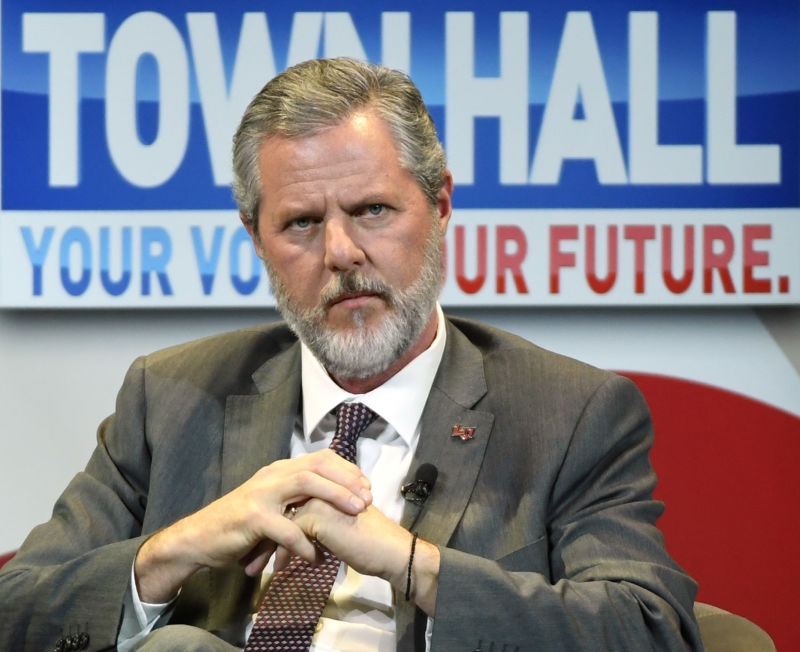
High-profile evangelical conservative Jerry Falwell Jr., a staunch Trump supporter and president of Liberty University, wants the FBI to investigate current and former university employees for… forwarding emails.
Falwell claims to have evidence that employees “improperly shared” emails belonging to the university, the Associated Press reports. Falwell said the communications were shared as part of a “criminal” smear campaign and “attempted coup.”
Falwell told the AP he contacted the FBI before the story was published, when he learned reporters were reaching out to Liberty employees about the “stolen” emails. “I am going to the authorities and I am going to civil court” over the shared documents, Falwell said.
The emails in question form the cornerstone of a magazine feature Politico ran Monday on Falwell and Liberty University. The story, running under the headline “Someone’s gotta tell the freaking truth,” dug into financial arrangements between the Falwell family, the school, and other entities, and it depicted the university as a “dictatorship” under Falwell’s thumb.
One official at Liberty told Politico, “We’re not a school; we’re a real estate hedge fund.” Politico added that several other employees:
[D]etailed other instances of Falwell’s behavior that they see as falling short of the standard of conduct they expect from conservative Christian leaders, from partying at nightclubs, to graphically discussing his sex life with employees, to electioneering that makes uneasy even those who fondly remember the heyday of the late Rev. Jerry Falwell Sr., the school’s founder and Falwell Jr.’s father, and his Moral Majority.
Reuters this week also published a selection of emails in which Falwell used insulting or disparaging language to describe Liberty University students, staff, and parents to other administrators.
“I’m not going to dignify the lies that were reported yesterday with a response,” Falwell told the AP, but he said he hired “the meanest lawyer in New York” to pursue civil cases against sources who shared communication with Politico.
“Liberty owns every single one of those emails. It’s our property. They were working for us when they used our server,” Falwell told the AP. “Our policies make it clear every email sent on our server is owned by Liberty, and if anybody shares it with anybody outside Liberty, it is theft. And so that’s the underlying crime.”
Employees who spoke with Politico apparently anticipated this kind of response from Falwell:
“Everybody is scared for their life. Everybody walks around in fear,” said a current university employee who agreed to speak for this article only after purchasing a burner phone, fearing that Falwell was monitoring their communications. The fear is not limited to Liberty’s campus. Several people who lack any tie to Liberty but live in the school’s hometown of Lynchburg, Virginia, refused to go on the record for this story, fearing Falwell would take revenge upon them and their families. “Fear is probably his most powerful weapon,” a former senior university official said.
Against the rules, but not the law
Politico reported that many Liberty University employees and board members are required to sign nondisclosure agreements that bar them from openly discussing matters pertaining to the school or to Falwell. Those agreements may be enforceable against the folks who talked to Politico, or they may not; that can be argued out in civil court.
The Computer Fraud and Abuse Act (CFAA) is the big law that governs what is and isn’t computer fraud. The CFAA outlines criminal penalties for an array of computer crimes, such as breaking into a computer or system to steal national security secrets, financial data, or to commit extortion. It also contains provisions relating to, for example, intentionally transmitting viruses, or trafficking in passwords.
So hacking a computer or system to obtain someone else’s emails is a crime. But choosing of your own volition to share an email in your possession is not, unless the content in it would violate some other kind of law, such as an executive sharing insider financial information in violation of securities law, a doctor sharing medical information in violation of HIPAA, or a lawyer sharing confidential information in violation of client privilege.
Some legal experts have made the case that email can be subject to copyright protection. Even if Liberty were to pursue a copyright claim against the sources who provided documents to Politico, though, that would be a different kind of claim from Falwell’s assertion that employees stole Liberty property off of Liberty servers by sharing copies of emails.
Falwell’s assertions of theft seem unlikely to be greeted with a strong response from the FBI, according to an expert the AP spoke with. He called Falwell’s assertions “totally insane,” adding, “I don’t think any law enforcement agency is going to be interested in this one.”
https://arstechnica.com/?p=1567915

